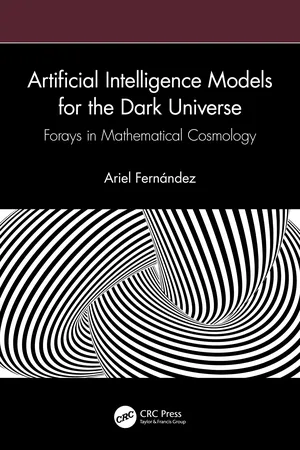
Artificial Intelligence Models for the Dark Universe
Forays in Mathematical Cosmology
- 240 pages
- English
- ePUB (mobile friendly)
- Only available on web
Artificial Intelligence Models for the Dark Universe
Forays in Mathematical Cosmology
About This Book
The dark universe contains matter and energy unidentifiable with current physical models, accounting for 95% of all the matter and energetic equivalent in the universe. The enormous surplus brings up daunting enigmas, such as the cosmological constant problem and the apparent distortions in the dynamics of deep space, and so coming to grips with the invisible universe has become a scientific imperative.
This book addresses this need, reckoning that no cogent physical model of the dark universe can be implemented without first addressing the metaphysical hurdles along the way. The foremost problem is identifying the topology of the universe which, as argued in the book, is highly relevant to unveil the secrets of the dark universe.
Artificial Intelligence (AI) is a valuable tool in this effort since it can reconcile conflicting data from deep space with the extant laws of physics by building models to decipher the dark universe. This book explores the applications of AI and how it can be used to embark on a metaphysical quest to identify the topology of the universe as a prerequisite to implement a physical model of the dark sector that enables a meaningful extrapolation into the visibile sector.
The book is intended for a broad readership, but a background in college-level physics and computer science is essential. The book will be a valuable guide for graduate students as well as researchers in physics, astrophysics, and computer science focusing on AI applications to elucidate the nature of the dark universe.
Key Features:
· Provides readers with an intellectual toolbox to understand physical arguments on dark matter and energy.
· Up to date with the latest cutting-edge research.
· Authored by an expert on artificial intelligence and mathematical physics.
Frequently asked questions
Table of contents
- Cover Page
- Half Title page
- Title Page
- Copyright Page
- Dedication
- Contents
- Introduction
- Chapter 1 The Dark Universe: Metamodel and Foundational Evidence
- Chapter 2 Quintessential Extension of Space-Time Yielding Mediators between Visible and Dark Sectors
- Chapter 3 Methods: Quintessential Autoencoders
- Chapter 4 Dark Matter in a Quintessential Extension of the Standard Model
- Chapter 5 Portal to the Dark Universe
- Chapter 6 Physical Footprints of a Computer-Simulated Universe: The Artifactual Nature of the Dark Universe
- Epilogue: Gauge Symmetry of Dark Matter Associated with the Conservation of Geometric Dilution Leads to Dark Boson Prediction
- Index